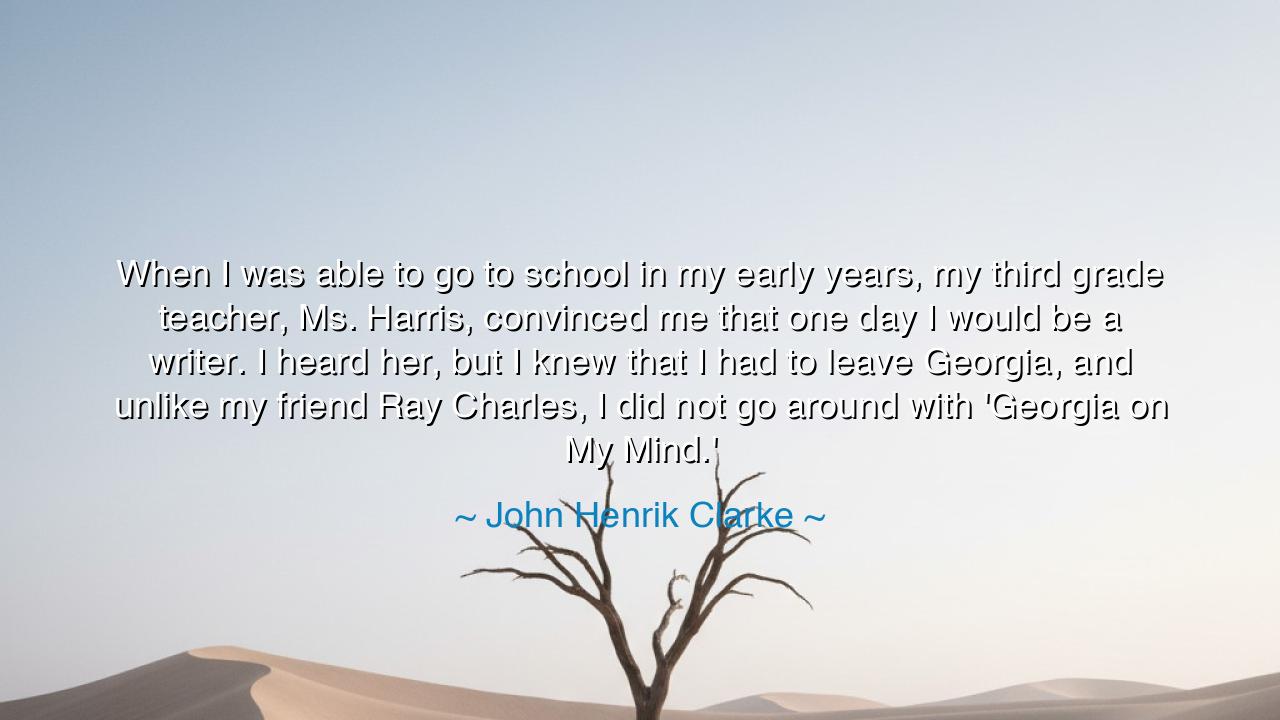
When I was able to go to school in my early years, my third
When I was able to go to school in my early years, my third grade teacher, Ms. Harris, convinced me that one day I would be a writer. I heard her, but I knew that I had to leave Georgia, and unlike my friend Ray Charles, I did not go around with 'Georgia on My Mind.'






Hear the words of John Henrik Clarke, a son of Georgia and a teacher to the world, who declared: “When I was able to go to school in my early years, my third grade teacher, Ms. Harris, convinced me that one day I would be a writer. I heard her, but I knew that I had to leave Georgia, and unlike my friend Ray Charles, I did not go around with ‘Georgia on My Mind.’” In this utterance lies the journey of a soul who listened both to the encouragement of a teacher and to the calling of destiny, a journey shaped by place, by struggle, and by the courage to leave behind what could not contain him.
The figure of Ms. Harris shines here as the prophetess of possibility. To a young boy in the South, where opportunity was scarce and doors often shut, she whispered a vision: “You will be a writer.” How powerful is the voice of a teacher upon the heart of a child! For often the world speaks to the young with doubt, telling them what they cannot be. But the teacher, if wise, speaks with belief, planting seeds that may grow into forests of greatness. Clarke heard her, and though the soil of Georgia was not yet fertile for his dreams, the seed had been planted.
Yet he adds, with honesty and clarity, that he had to leave Georgia. For though it was his birthplace, it was also a land of limits, a place where his genius could not flourish under the shadow of segregation and poverty. Unlike his friend Ray Charles, who carried Georgia in song, Clarke could not carry it in mind or spirit; he had to journey outward to find the freedom to write, to teach, to awaken others. Thus his path was not one of nostalgia but of departure, for sometimes the love of one’s destiny requires leaving the soil of one’s birth.
Consider the story of Joseph in Egypt. Betrayed by brothers, torn from his homeland, he might have clung to bitterness or despair. Yet in the foreign land he rose, he found his voice, and he saved nations. So too with Clarke: by leaving, he found the space to grow, to become a historian, a storyteller, a guardian of African memory. His greatness was not in clinging to the past, but in creating a future where his people’s voices could be remembered and heard.
The meaning here is profound: encouragement is the spark, but courage to depart is the fire. Ms. Harris gave Clarke the vision, but Clarke himself took the journey. To remain in comfort, to remain in nostalgia, would have been to stifle the calling. He teaches us that one must sometimes leave behind the familiar in order to fulfill the prophecy spoken over their life. The land of your birth is sacred, but it is not always the land of your becoming.
The lesson for us is this: cherish those who believe in you, for their words may reveal the path of your destiny. But also be willing to step beyond the boundaries that confine you. Do not carry with you the chains of nostalgia when they hinder growth. Be like Clarke: hear the encouragement, honor it, but then rise and go where your voice can truly be heard. For it is better to leave home and find your destiny than to remain at home and bury your gift.
Therefore, let these practical actions be taken: Remember the words of your teachers, mentors, and guides, and let their faith in you strengthen your resolve. Do not fear to step away from places, people, or habits that diminish your growth. Carry your roots with honor, but do not let them hold you captive. And above all, pursue the calling within you, even when it demands sacrifice, even when it demands leaving behind what is familiar.
So remember Clarke’s words: the teacher’s encouragement, the leaving of Georgia, the refusal to carry “Georgia on My Mind.” From these comes the story of a man who became a voice for his people and a teacher to the nations. Let his story remind you that destiny requires both a seed planted by others and the courage to walk the path yourself.






AAdministratorAdministrator
Welcome, honored guests. Please leave a comment, we will respond soon